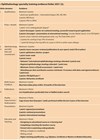
Attempting the FRCOphth Part 1 examination as a foundation trainee requires significant time and financial commitment. Unlike the MRCP and MRCS examinations, the curriculum of this exam does not overlap with the undergraduate syllabus. As such, it is a steep learning curve, and considerable effort on the foundation trainee’s part, to acquire the knowledge in basic ophthalmic and biomedical sciences required to pass this exam.
As there are limited foundation training posts in ophthalmology, most candidates, including myself, have attempted the FRCOphth Part 1 without clinical exposure to ophthalmology. The benefits of passing the FRCOphth Part 1 include:
- Contribution to portfolio points (25% of points in the ‘Ophthalmology specialty links and commitment to career’ domain).
- Opportunity to focus on other competencies and skills in the first two years of ophthalmic specialty training (OST).
- Build clinical knowledge which may help with OST interviews.
Furthermore, a cohort study published in 2021 has shown that candidates who took the FRCOphth Part 1 prior to OST were more likely to obtain a training post at first attempt [1]. Thus, the value of attempting the FRCOphth Part 1 prior to specialty training may be advantageous, especially for the foundation trainee who is committed to ophthalmology. Here is a list of practical tips that will help the foundation trainee approach this exam:
1. Timing of the exam
Studying for an exam while working full-time is a challenging task, let alone having to adhere to an on-call rota. Most foundation trainees would have their assigned placements a year in advance. This would help to plan when would be the best time to sit for the FRCOphth Part 1.
Every year, there are three opportunities to attempt this exam: January, April and October. It would be wise to prepare and sit for the exam on placements with less demanding clinical commitments, such as placements without on-call duties and low ward patient load. However, it is important for revision to not compromise clinical duties.
2. Study the curriculum and format
As with all exams, there is a specific curriculum where candidates would be tested within its boundaries. The FRCOphth Part 1 syllabus is divided into Basic and clinical sciences and Patient investigations. There is a lot to learn in terms of exam content. It may be helpful to list the various domains of the curriculum, as listed on the RCOphth website, and make notes using available textbooks and resources. Reading previous candidates’ experiences of the exam and going through common high-yield topics will help to provide a focused framework for revision. This can be obtained from ophthalmology forums such as www.eyedocs.co.uk.
In October 2021, the RCOphth changed the format of the exam to two multiple choice questions (MCQ) papers of 90 questions each, in contrast to the previous format (120 MCQ questions and 12 constructed response questions). It is important to note that in order to pass the exam, candidates would have to pass both MCQ papers.

3. Structure your revision
As mentioned previously, preparing for this exam whilst working full-time is challenging, especially without experience within the specialty. Here is a suggestion for revision structure:
- Seven to eight months prior to the exam: Learn the syllabus and organise revision notes. Set aside a few hours a week to do this, no intense studying should be required yet.
- Five to six months prior to the exam: Start familiarising yourself with various exam questions of different formats (MCQs, EMQs and CRQs). Revision should become more frequent.
- Three to four months prior to the exam: At this point, the candidate should identify knowledge gaps and rectify them. Set aside one to two hours a day for revision, and perhaps more on the weekends and rest days, if time permits.
4. Use available resources
While there is a wealth of written ophthalmology resources, the RCOphth have a specific list of recommended ophthalmology textbooks for the exam. A fellow candidate has summarised a personal recommended list in another Eye News article here. It may be costly to purchase these textbooks; your local hospital library may have some of these. Alternatively, one can request for certain resources to be purchased by the library, subject to the local policies.
5. How to study optics
Optics is notoriously known to be one of the most challenging parts of this exam. While reading materials such as Elkington’s Clinical Optics may be helpful, due to the abstract nature of Optics, visual and video aids on Youtube, such as Laramy-K Optical and Smart Optometry should help provide a more robust method of learning the topic. The most important part of conquering Optics is to practice, practice and practice! Wai-Ching Leung’s Revision in Optics and Refraction and Bhan’s MCQs and OSCEs in Optics and Refraction are excellent self-assessment tools for this.
6. Saving for exam cost
Exams and courses are known to be a significant financial commitment across all training specialties. As a foundation trainee, paying £615 off one’s salary can be a costly affair. If committed to this exam, it may be wise to set aside a small portion from the salary every month to save for the FRCOphth Part 1. Contributing £100 a month towards this may enable the candidate to take the FRCOphth Part 1 and attend Introduction to Ophthalmic Surgery Course in a year’s time, both of which would contribute to OST application. It is worth remembering to claim tax on exam fees before the tax year ends!
7. Enjoy the learning process and look after yourself!
Exam season is a gruelling time where anxiety levels significantly skyrocket. It is important to be able to recognise your limits. While one would most likely have to sacrifice weekends and rest days for this exam, it is important to look after your mental health and take a break when necessary. For example, in the months coming up to the exam, instead of going on a long weekend break for a holiday, look to do short day-trips instead.
Revising for this exam is after all, part of a learning process towards a specialty that one is committed to – so enjoy it!
Reference
1. Das A, Smith D, Mathew RG. Predictors of ophthalmology career success (POCS) study. BMJ Open Ophthalmology 2021;6(1):e000735.
Declaration of competing interests: None declared.
COMMENTS ARE WELCOME











